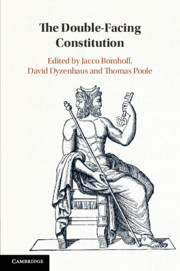Book contents
- The Double-Facing Constitution
- The Double-Facing Constitution
- Copyright page
- Contents
- Contributors
- 1 Introduction
- Part I Theoretical Foundations
- Part II Border Crossings: Comity and Mobility
- 7 The Spectre of Comity
- 8 Constitutionalism and Mobility: Expulsion and Escape among Partial Constitutional Orders
- 9 The Inside-Out Constitution
- 10 The Constitution in the Shadow of the Immigration State
- Part III The Foreign in Foreign Relations Law
- Index
7 - The Spectre of Comity
from Part II - Border Crossings: Comity and Mobility
Published online by Cambridge University Press: 17 January 2020
- The Double-Facing Constitution
- The Double-Facing Constitution
- Copyright page
- Contents
- Contributors
- 1 Introduction
- Part I Theoretical Foundations
- Part II Border Crossings: Comity and Mobility
- 7 The Spectre of Comity
- 8 Constitutionalism and Mobility: Expulsion and Escape among Partial Constitutional Orders
- 9 The Inside-Out Constitution
- 10 The Constitution in the Shadow of the Immigration State
- Part III The Foreign in Foreign Relations Law
- Index
Summary
Karen Knop takes up the question ‘[h]ow do we study doorways and the constitution?’ and offers an answer in a deliberately ‘explanatory and experimental vein’. Her contribution focuses on the curious introduction, by the Supreme Court of Canada, of ‘comity’ as a principle of interpretation for the Canadian Charter of Rights and Freedoms. Curious, because, as Knop writes, while the ‘constitutionalization of comity is familiar’, notably in the area of private international law, ‘the “comitization” of the Constitution is not’. Knop analyzes four leading decisions by the Supreme Court of Canada, each of which figured ‘something(s) called “comity”’ as ‘a way in which the existence of, dependence on and regard for the Other figure in the constitution’. Using these four cases, Knop is able to elaborate a history of ‘cosmopolitanism introduced into the Constitution by comity’, that both reaches further back and is richer – in including also private legal relations – than familiar accounts of the post-Second World War emergence of international human rights regimes in public international law.
Keywords
- Type
- Chapter
- Information
- The Double-Facing Constitution , pp. 177 - 210Publisher: Cambridge University PressPrint publication year: 2020



